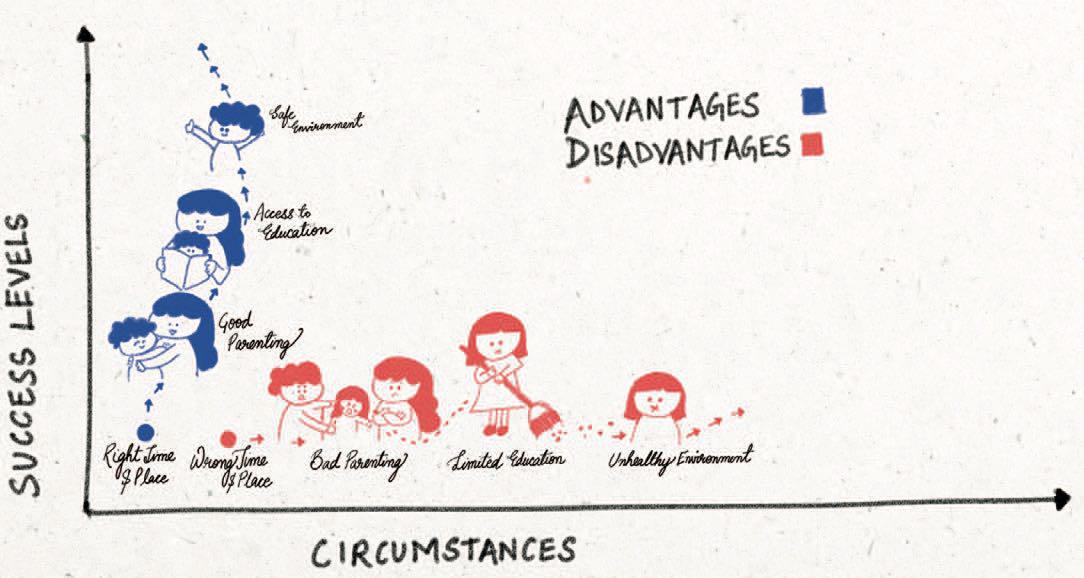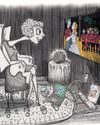試す 金 - 無料
Success & Luck
Philosophy Now
|February/March 2024
Carlo Filice argues that we should share our success, even if it's hard earned, because we often don't deserve it as much as we'd like to think.

In thinking about slightly redistributive economic policies, it is essential to address a belief many people hold deeply. This is the belief that honest, hard-working people always deserve most or all that they earn. This belief is bound up with notions of fairness, of self-ownership, and with ideas of the very essence of what a person is. Unfortunately these are also the very notions that undermine the belief in absolute deserving, once examined.
Let's start with the part that's hard to dispute. Those who end up toiling hard in low paid physical or mental labor deserve their pay, and much more. At the opposite end are those who end up fabulously wealthy who have often been targeted as undeserving of their sheer amounts of money. A case in their defense could be made if their success was attained fairly and was a necessary by-product of the best possible market system meaning the one that benefits people more than any of the alternatives. But neither of these conditions are empirically true.
First, most current market systems do not benefit all people, or even a greater percentage of people, more than all alternative systems. Scandinavian countries often do best on overall happiness, and they operate extensive welfare systems. Second, the neo-liberal free market system is not like Monopoly, where chance and skill combine to produce winners fairly because all the players start out with equal resources. Rather, the starting points are always deeply unequal. Not surprisingly, most children of upper class families remain in the upper classes as adults, and most children of lower class families remain in the lower classes. This is so even if there is no formal cheating by the upper class parents and children. The sociological data supporting this seems incontrovertible.
このストーリーは、Philosophy Now の February/March 2024 版からのものです。
Magzter GOLD を購読すると、厳選された何千ものプレミアム記事や、9,500 以上の雑誌や新聞にアクセスできます。
すでに購読者ですか? サインイン
Philosophy Now からのその他のストーリー

Philosophy Now
Pharmaco-Metaphysics?
Raymond Tallis argues against acidic assertions, and doubts DMT discoveries.
7 mins
August/September 2025

Philosophy Now
Nine Spiritual Exercises
Massimo Pigliucci explains how to get Philo-Sophical.
3 mins
August/September 2025

Philosophy Now
Books
We follow mammal's search for meaning, as Mark Vorobej savages John Gray's book of impractical cat philosophy, while B.V.E. Hyde ponders the point of Jordan Peterson. In Classics, Hilarius Bogbinder reviews Plato's Republic.
21 mins
August/September 2025

Philosophy Now
The Centennial of the Scopes ‘Monkey’ Trial
Tim Madigan on the creation and the evolution of a legend.
14 mins
August/September 2025

Philosophy Now
Gödel, Wittgenstein, & the Limits of Knowledge
Michael D. McGranahan takes us to the edge of language, mathematics and science.
10 mins
August/September 2025

Philosophy Now
Weltschmerz and the World
Ian James Kidd takes a realistic and global view of the history of pessimism.
10 mins
August/September 2025
Philosophy Now
What Makes A Work Of Art Great?
Each answer below receives a book. Apologies to all the entrants not included.
16 mins
August/September 2025

Philosophy Now
The Beatles: Nothing is Real
Clinton Van Inman gets back to the psychedelic Sixties.
4 mins
August/September 2025

Philosophy Now
The Post-Truth Kerfuffle
Susan Haack, who is Distinguished Professor in the Humanities, Cooper Senior Scholar in Arts & Sciences, Professor of Philosophy, and Professor of Law, at the University of Miami, talks with Angela Tan about how and when we know.
11 mins
August/September 2025

Philosophy Now
A Crisis of Attention
Paul Doolan attends to our culture of attention demanding.
13 mins
August/September 2025
Listen
Translate
Change font size
